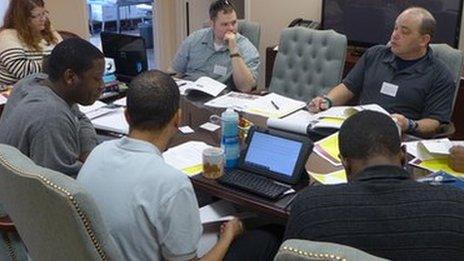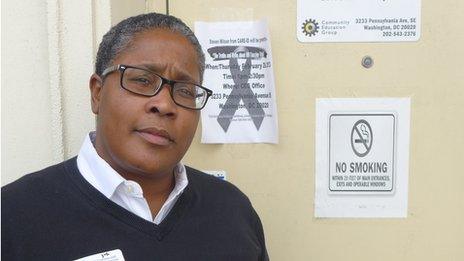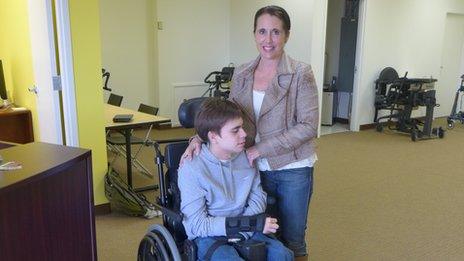Sequester: Washington-area residents on how it will affect them
- Published
The White House says Washington DC and neighbouring Maryland and Virginia will be among the places hardest hit by the automatic budget cuts known as the sequester.
The administration's analysis, dismissed by some Republicans as fear-mongering, paints a picture of deep cuts in public health and disability programmes and meals for the elderly, among other services.
Around the Washington area many are wondering what the coming months will mean for them.
Here are just a few:
De'Andre Battle and James Sprecher

Battle (left) and Sprecher (right with name tag) are civilian employees of the Department of Defense
Mr Battle and Mr Sprecher are among 800,000 defence employees facing the prospect of 22 days of unpaid leave over the next six months. It could amount to a 20% pay cut.
James Sprecher, defence department police officer
My wife and I are expecting a baby in the near future and we have been looking at getting part-time jobs outside of what we do right now.
We have a house, we have a mortgage and are soon-to-be parents, so it's going to affect us dramatically. It's going to cut down on our bill-paying, on what bills we can pay, what bills we can't pay, it's going to affect us overall.
When you cut back the Department of Defense, you are cutting back on our national security. I believe they should have cut back on the salaries of the congressmen.
De'Andre Battle, civilian military technician
The information that I've received is that we will be having some days off, up to 22 days. That is 22 unpaid days of leave.
For the most part we have been trying to see what bills are necessary to pay and to scale back on the ones that aren't. As time moves forward, depending on how it affects my family, we might have to make some drastic decisions, but as of right now, everything is uncertain.
Toni Young

Ms Young is founder of the Community Education Group in south-east Washington, which works in HIV testing and prevention in some of the city's poorest neighbourhoods.
The White House estimates the sequester will cut $700,000 (£466,000) from public health services in Washington.
I think something severely bad is looming. We are going to see immediate impacts but we then have to look long-term. If social programmes are now tapped, will they be tapped over the long haul? That's probably my biggest fear.
We might have to cut back on HIV test kits and condom distribution. We would need to find other resources to pay for those and therefore cut back on other programme areas.
We are on Pennsylvania Avenue. From the highest point over here in the south-east, you can see the Capitol. But I don't think they have any concept of how their policies impact individuals in these communities.
For an individual who has a moderate income who may experience a long wait line at the airport, that's one thing. But if it's an individual who may have food stamps or a housing benefit withheld, that has an immediate and direct family impact.
Debbie Sahlin

Ms Sahlin is a single mother and founder of the Lollipop Kids Foundation, which helps families raise children with disabilities. Her 18-year-old son Ryan suffered a traumatic brain injury when he was a baby.
His school in Maryland receives federal funds for some of its special education programmes. According to the White House, Maryland schools will lose $24m this year as a result of sequestration.
If it comes down to it that my child, in school, loses his one-on-one aide, then I don't know how he could safely go to school. I don't know how I could plan for that, I would just have to deal with it.
Para-educators could be reduced by half to fill that kind of deficit. The staff that are still there will be responsible for more children than they will be able to care for and I strongly feel that someone is going to get hurt. And it's going to be one of the kids.
Reporting by Paul Adams and Robert Brown
- Published2 March 2013
- Published28 February 2013
- Published26 February 2013
- Published1 March 2013